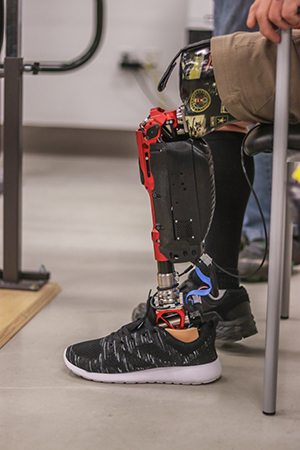For amputees, walking down the sidewalk verses taking the stairs can be considerable obstacles. Mechanical engineering assistant professor Tommaso Lenzi (pictured right) just received collaborative funding with Drs. Nicholas Fey and Kenneth Hoyt (University of Texas at Dallas), from the National Science Foundation Civil, Mechanical and Manufacturing Innovation (NSF CMMI), National Robotics Initiative (NRI), for their research entitled, “Muscle Ultrasound Sensing for Intuitive Control of Robotic Leg Prostheses,” $600,987 (U), and $578,233 (UT).
 The goal of this project is to fill the knowledge gap regarding the integration of the user’s volition or intuitive will, in the control of lightweight robotic ankle and knee prostheses. The Utah lightweight leg is comprised of powered ankle and knee modules, and is roughly half the weight of contemporary technologies. The team will use sonomyographic sensors in combination with mechanical sensors to infer the user’s intent in anticipation of ambulation mode or joint motion, for example locomotor transitions from walking over level ground to ramps or stairs.
The goal of this project is to fill the knowledge gap regarding the integration of the user’s volition or intuitive will, in the control of lightweight robotic ankle and knee prostheses. The Utah lightweight leg is comprised of powered ankle and knee modules, and is roughly half the weight of contemporary technologies. The team will use sonomyographic sensors in combination with mechanical sensors to infer the user’s intent in anticipation of ambulation mode or joint motion, for example locomotor transitions from walking over level ground to ramps or stairs.
If successful, the project will have positive impact on national health and welfare by improving the lives of individuals with amputation in terms of their independence and ambulation abilities. For more information on Dr. Lenzi and his research visit the Bionic Engineering Laboratory.